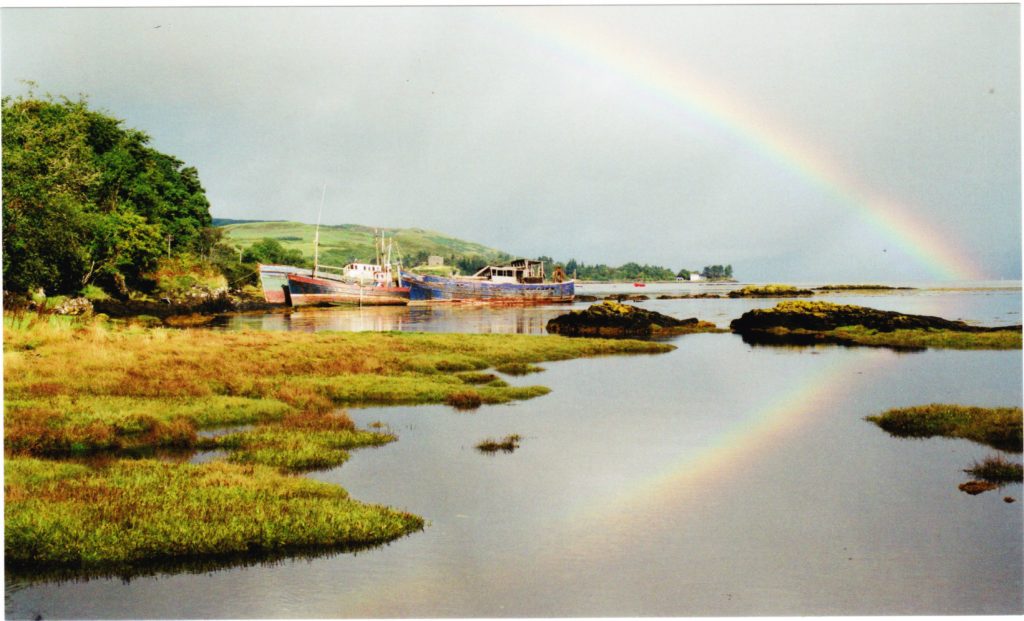Richard Fleming looks into the not-so-distant, salmon-abundant past.

Salen Bay, by Nick Holmes
One summer evening in a previous life – I’ve had several, though I’m starting to wonder if this may be the last – I was steering the curach past Archie Cameron’s fishing shelter when I took the notion to have a look at his set-net.
Salmon netting in those days had a Galilean look, except I doubt Peter and Andrew wore wellies. Archie’s salmon boat was supposed to rest on the shore, with his shore-seine net neatly arranged on a board in the stern, float-rope one side and lead rope on the other, at a point where the rocks jutted out at the end of the bay. Archie and his crew sat on the bench in the shelter, compulsively scanning the sea loch for the wash, willing into existence the faint ripple on the surface that indicated when a swim of salmon was coming round the bay. When they saw the swim coming they rowed out and round it as the net slid off the stern, and then hauled the net up the shore. Any salmon were hit on the head with a wooden club called the Priest, the net was rearranged on the board again, and they all got back into mesmerising the sea.
You could tell who the salmon men were in the bar of the hotel because they kept looking past you at the loch outside, looking for swims.
The salmon men weren’t allowed to fish at night, but many of them put an illegal set-net out at night before they left. A set-net is a length of gill net, with floats on the top rope and a weighted cord at the bottom, anchored so as to float with the diamond shaped holes between the meshes ready to catch salmon by the gills. I used to do this too. You could go out in the dark in the summertime and give the net a jerk, and the phosphorescent plankton would light up so that you could see the fish hanging in the net.
So I steered the curach towards the shore. The net must have been heavy with weed and the tide had pulled it under. I didn’t see it, and I caught it with the propeller on my ‘British Seagull’ outboard motor. I thanked whoever looks after fishermen that I had a knife in the boat, cut the outboard free of a big chunk of net, and sat there thinking about the moral problem this had caused.
There were no houses overlooking that part of the loch, except maybe two miles away on the other side. No one had seen me, I could be sure. Often seals found salmon in set nets and ripped them out, leaving annoying holes. It was certain that Archie would blame the seals. Feeling a bit guilty about the seals, aware that they might get shot as a result, I went ashore to pick up some seaweed to keep my catch cool. I had a crate of freshly lifted prawns in the curach. (We called them prawns, you probably call them Langoustines). I steered home and to the keep-box where I kept the prawns. I was still a bit uneasy, mainly about the seals, and in the morning I told Archie that I had hit his net while innocently going ashore for weed to keep the prawns moist. Would he drop it off at my place for me to mend?
Mending a big tear in a gill net isn’t easy, because the meshes have to hang true if the net is to fish well. And though I would certainly like you to think I am a modest man, not prone to boasting, the story would lose some of its point if I didn’t tell you that I made a damned good job of it.
I put in a large irregular patch of new net knotted in to the edges of the tear in Archie’s net, the strand of netting cord forming new meshes as it was knotted in a zig-zag to link the old and new. Then I trimmed off the ragged edges until it was hard to see where the patch was. Archie was well impressed – the salmon men themselves were often not much good at net-mending. We never discussed how closely I had come to not telling him about it.
I’ve told this story several times, enough for it to seem more significant to me now than it did at the time. I’ve even inflicted it on my children, as a parable – Galilee again – of how a bad situation can be turned around, for there is no doubt I went up in Archie’s estimation both as a stand-up guy and as a net mender. But as I write this I realise I’m doing it not to moralise – nor, the protector of fishermen forbid, to boast – but because I want you to have a glimpse of a time not so many of my lives ago when salmon were jumping all around the sea lochs from spring to autumn, and men like Archie Cameron or Roddy MacAskill stared at the loch all summer in their wellies.
*
This piece is extracted from one of Richard’s posts on Substack, which you can read in full here.
Nick Holmes is a photographer based on Mull. His colour photographs are the selective results of an ongoing exploration of the ephemeral interface between water, air, light, rock/sand. His most recent solo exhibition was ‘Water & Light’ at The Bear Steps Gallery, Shrewsbury, and his most recent residency ‘Isabella Bird: A Lady’s Life in The Rockies, Revisited’, in the Rocky Mountain National Park, Colorado.